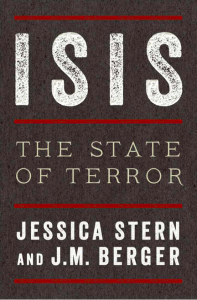 About a week ago I wrote a few notes on my reading of ISIS: Inside the Army of Terror by Michael Weiss and Hassan Hassan. I followed that with Jessica Stern’s and J.M. Berger’s ISIS: The State of Terror. It’s a great companion to former work; don’t hold off thinking it might be redundant if you’ve already read the former.
About a week ago I wrote a few notes on my reading of ISIS: Inside the Army of Terror by Michael Weiss and Hassan Hassan. I followed that with Jessica Stern’s and J.M. Berger’s ISIS: The State of Terror. It’s a great companion to former work; don’t hold off thinking it might be redundant if you’ve already read the former.
One small detail but a most valuable asset is an appendix by a Brown University doctoral student, Megan K. McBride, providing one of the most readable and informative outlines of the history and nature of Islam and where the various movements that culminated in ISIS fit in to that overview. My first reaction to reading it was to want to contact the author and seek permission to post it in Vridar.
A principal difference from the Weiss and Hassan study is that Stern and Berger explore in much greater depth the way ISIS is really such a modern phenomenon with the strategic ways it has exploited modern communication technologies, especially social media. I first heard the expression “barbarism empowered by modern technology” as a graduate student to refer to the Nazi machine of World War 2. ISIS is reverting to the most primitive forms of barbarism but empowering that barbaric message through modern communications technology. Beheadings have been historically employed as a “mercifully” swift means of execution; not for ISIS where some deliberately seek out blunt knives to do the job. The object is to strike fear, of course, as well as demonstrate to idealistic potential recruits just how serious they are. Bizarrely bloodthirsty messages are somehow mixed with video shots of an ideal visionary society, a caliphate where children are happy (even if playing with decapitated heads on corpse-lined streets) and the true ways of Allah ensure a purified “utopia”. Gone are the defeatist messages of the old terrorists like Al Qaeda with their expectations of being overwhelmed by godless forces and hopes for a future paradise. The heavenly kingdom is here now; the jihadists are strong and terrifying in their strength. That is their message and that is what makes them different from other terrorist groups. Continue reading “Another Study of ISIS”
